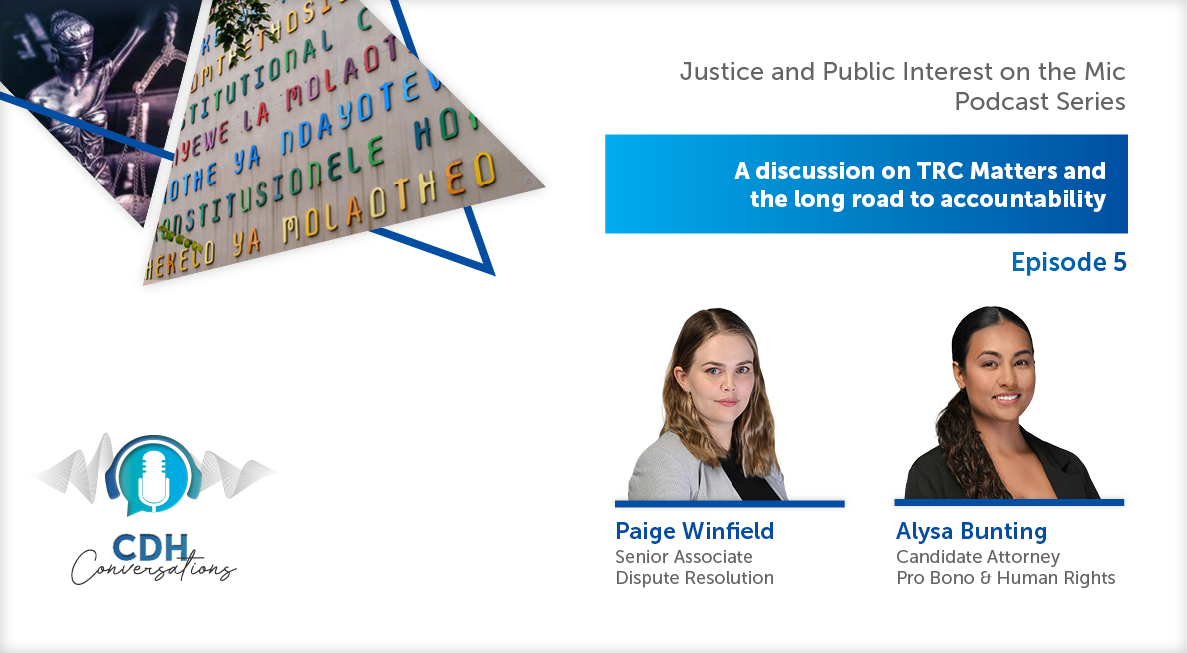Socio-economic challenges in the face of a nationwide lockdown
Ordinarily, the National School Nutrition Programme (school feeding scheme) ensures that many children attending school who would otherwise go hungry obtain at least one meal a day. But the closure of schools without any contingency plan for the continuation of school feeding schemes has meant many children no longer have access to what was at least one guaranteed meal a day. So with breadwinners deprived of an income and schools closed, many families find themselves without food or any form of food security.
This is the current reality for many living in South Africa, despite the fact that our Constitution affords some of the most comprehensive protection and inclusion of socio-economic rights in comparison to its global counterparts. The Bill of Rights makes explicit provision for socio-economic rights which are legally enforceable and places a legal duty on the government to take active steps to progressively implement these rights and ensure their protection. Given the horizontal application of our Bill of Rights, even the private sector and private individuals have obligations to respect and promote the human rights enshrined therein. Yet despite having a constitution which is designedly committed to promoting social justice, South Africa remains one of the most unequal countries in the world, and the current crisis has simply served to highlight just how far we need to go to make provision for even the most basic of rights for all in this country.
The fact that many communities across the country still do not have access to a basic supply of water, housing or adequate food supplies has been thrown into sharp focus. How can anyone heed the call to wash their hands when they have no access to clean water? How do you observe social distancing when you share a small shack with a number of others in a densely populated informal settlement? It is regrettable that it has taken a crisis like COVID-19 for the government to recognise the real urgency in providing at least temporary access to water and at least rudimentary forms of housing to desperate communities.
Cognisant of the plight of many, the government has put numerous measures in place to assist those in need and must be commended for doing so. It recently reported that between 58,000 to 100,000 households have received food parcels since the beginning of lockdown and that more households will be supported through the newly established Solidarity Fund, and the Department of Social Development’s Disaster Relief Fund.
The South African Social Security Agency (SASSA) has also allocated R400 million for food parcels and vouchers. However, SASSA has been overwhelmed with calls for social assistance, reportedly receiving an average of 9,000 calls per hour. This has led to many families not receiving food parcels and some going without food for several days. The lack of food security has, unfortunately, reportedly led to incidents of looting of grocery stores and food delivery trucks, and growing social unrest. Despite government’s efforts, millions are still left without any food either due to the shortage of and slow distribution of food parcels or because many failed to meet the criteria for disaster relief in the first place. Many impoverished South Africans have expressed their fears that they are more likely to die of starvation than of COVID-19 – fears which are by no means unjustified.
Disconcertingly, it has also been reported that vulnerable groups such as asylum seekers, refugees and migrants have been denied access to social assistance despite being equally impacted by COVID-19, with many being left hungry and without any form of food security. This notwithstanding the fact that the right to access to social security in our Constitution applies to “everyone” and not only to citizens.
As the government struggles to finalise plans to feed the growing number of hungry people, many are relying on NPO’s and community-based organisations for their meals. The South African Food Sovereignty Campaign estimates that the number of “food-stressed people” has doubled from last year to 30 million. This includes 4 million people in the informal sector who cannot work and 18 million people on social grants who do not earn enough to buy increasingly expensive food. Alarmingly many organisations note that mothers are at the forefront of the hunger crisis, with many going without so their children can eat.
On 21 April 2020, government announced its further extraordinary economic relief ramping up its efforts to relieve hunger and provide assistance to those in social distress. Some of the relief measures include funding of R20 billion that has been allocated to provide emergency water supply, providing food and shelter for the homeless. Additionally, there will be an increase in current grants. Child support grant beneficiaries will receive an extra R300 in May, and from June to October they will receive an additional R500 each month. All other grant beneficiaries will receive an extra R250 per month for the next six months.
To mitigate the shortage of food parcels, SASSA will also provide food assistance through vouchers and cash transfers to ensure efficient supply of food to South Africans and refugees in need. Furthermore, the Department of Social Development has partnered with the Solidarity Fund, NGOs, and community-based organisations to distribute an estimated 250,000 food parcels across the country. A COVID-19 Social Relief of Distress grant of R350 a month was also introduced which will be paid to individuals who are currently unemployed and do not receive any other form of a social grant or UIF payments for the next six months.
But the last few weeks have illustrated that our social security system as currently configured is simply not geared for delivering emergency relief to all who need it. It, therefore, remains unclear whether the extended social relief package will timeously reach the millions who require urgent relief.
Moreover, many believe that the R350 grant is simply insufficient given that South Africa’s extreme food poverty line is currently at R561 per person per month. This refers to the amount of money that an individual will need to afford the minimum required daily calories to survive. But given the fragile state of our economy which has already been ravaged by years of volatility in global markets, state capture and the recent downgrades, the government has little if any leeway to provide more extensive relief.
The administrative hurdles that beneficiaries are required to meet in order to qualify, will also likely mean that many of the most needy will simply not qualify. In truth, many of the most vulnerable will not be able to provide the documentation being demanded in order to make an application for the benefits. Hundreds of thousands of South Africans (often the poorest) through no fault of their own have no birth certificates or identity documents and have no bank accounts into which the grant can be paid.
Thus while the government has taken significant steps to address the socio-economic impact of the lock down, it has become increasingly evident that the current response is unlikely to be sufficient to meet the gaping need and that the systemic maladministration and corruption enabled by almost a decade of state capture has set us back considerably in our ability to meet the demands of this social emergency. The crisis sadly demonstrates just how far we are from achieving the constitutional promise of a “society based on democratic values, social justice and fundamental human rights” (Preamble to the Constitution).
It is disheartening that more than two decades into our democracy so many millions in our country remain impoverished and are being reduced to absolute desperation by this state of disaster. Never has the severity and extent of the socio-economic distress in our country been more evident.
Whether or not as a society we will learn from the mistakes of our past and make a concerted collective effort to make good on the constitutional promise of social justice for all in the foreseeable future remains to be seen. What is clear is that there can be no equality, no humanity and in truth no social, economic or political stability in a nation where basic socio-economic rights essential to survival elude the majority of our population. If nothing else positive comes out of the COVID-19 pandemic, may the social crisis it has left in its wake, ever remind us that the virus is not the only epidemic we are battling, so is poverty.
The information and material published on this website is provided for general purposes only and does not constitute legal advice. We make every effort to ensure that the content is updated regularly and to offer the most current and accurate information. Please consult one of our lawyers on any specific legal problem or matter. We accept no responsibility for any loss or damage, whether direct or consequential, which may arise from reliance on the information contained in these pages. Please refer to our full terms and conditions. Copyright © 2026 Cliffe Dekker Hofmeyr. All rights reserved. For permission to reproduce an article or publication, please contact us cliffedekkerhofmeyr@cdhlegal.com.
Subscribe
We support our clients’ strategic and operational needs by offering innovative, integrated and high quality thought leadership. To stay up to date on the latest legal developments that may potentially impact your business, subscribe to our alerts, seminar and webinar invitations.
Subscribe




